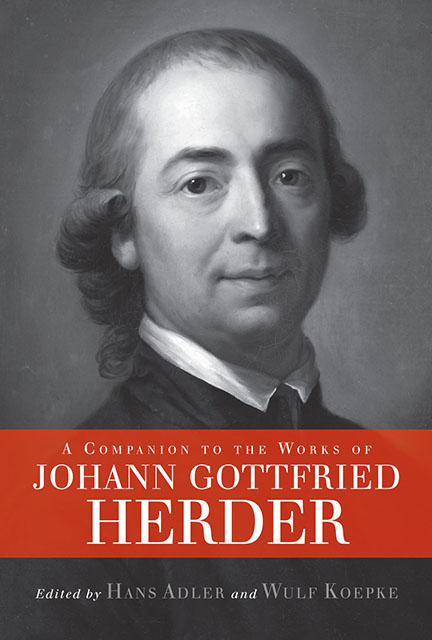Book contents
- Frontmatter
- Contents
- Acknowledgments
- List of Abbreviations
- Introduction
- 1 Herder's Life and Works
- 2 Herder's Epistemology
- 3 Herder and Historical Metanarrative: What's Philosophical about History?
- 4 Herder's Concept of Humanität
- 5 Herder and Language
- 6 Herder's Aesthetics and Poetics
- 7 Myth, Mythology, New Mythology
- 8 Particular Universals: Herder on National Literature, Popular Literature, and World Literature
- 9 Herder's Views on the Germans and Their Future Literature
- 10 Herder's Biblical Studies
- 11 Herder's Theology
- 12 Herder and Politics
- 13 Herder's Poetic Works, His Translations, and His Views on Poetry
- 14 Herder's Style
- 15 Herder as Critical Contemporary
- 16 Herder in Office: His Duties as Superintendent of Schools
- 17 Herder's Reception and Influence
- Bibliography
- Notes on the Contributors
- Index
5 - Herder and Language
Published online by Cambridge University Press: 28 February 2023
- Frontmatter
- Contents
- Acknowledgments
- List of Abbreviations
- Introduction
- 1 Herder's Life and Works
- 2 Herder's Epistemology
- 3 Herder and Historical Metanarrative: What's Philosophical about History?
- 4 Herder's Concept of Humanität
- 5 Herder and Language
- 6 Herder's Aesthetics and Poetics
- 7 Myth, Mythology, New Mythology
- 8 Particular Universals: Herder on National Literature, Popular Literature, and World Literature
- 9 Herder's Views on the Germans and Their Future Literature
- 10 Herder's Biblical Studies
- 11 Herder's Theology
- 12 Herder and Politics
- 13 Herder's Poetic Works, His Translations, and His Views on Poetry
- 14 Herder's Style
- 15 Herder as Critical Contemporary
- 16 Herder in Office: His Duties as Superintendent of Schools
- 17 Herder's Reception and Influence
- Bibliography
- Notes on the Contributors
- Index
Summary
I. Philosophy of Language
AFTER BACON'S DISCOVERY OF THE non-scientific semantics of natural language as idola fori, “idols of the marketplace” and the most serious obstacle to true knowledge, and after Locke's attempt to integrate language into a theory of human understanding in his Essay Concerning Human Understanding (1690), and after his proposals for coming to terms with the epistemological problem of language (which is “a mist before our eyes”), language was on the agenda of the philosophy of the eighteenth century — at least of its empiricist current. Rationalist philosophy generally speaking has no problem with language, and, hence, nothing interesting to say about it. The most important answers to Locke's Essay, Etienne Bonnot de Condillac's Essai sur l’origine des connaissances humaines (Essay on the Origin of Human Knowledge, 1746), Gottfried Wilhelm Leibniz's Nouveaux essais sur l’entendement humain (New Essays on Human Understanding, 1765), and, in a certain way, also Giambattista Vico’s Scienza Nuova (The New Science, 1744), necessarily deal with language. They all know that human “understanding,” “connaissances,” “entendement,” “scienza” have infallibly something to do with language. The question is to what extent and whether this is good or bad.
There is no other philosopher of the eighteenth century — but shall we call him a philosopher anyway? — who is haunted by language in the same passionate way as is Herder. And there is no other philosopher of the eighteenth century for whom language is to the same extent and with the same intensity the heart of a philosophy of knowledge — and hence of philosophy tout court — and therefore the main object of philosophy. In that sense, Herder is the creator of the “philosophy of language” as an autonomous philosophical reflection on language, not only as a “linguistic philosophy,” that is, a philosophy (of knowledge, of action, of beauty, etc.) that deals with language because language comes along as an obstacle to truth or to true philosophical or scientific discourse.
Recent studies have fervently tried to show (why this strange passion?) that many of Herder's ideas about language are shared by other thinkers, and that he is only one link in the chain of European reflection on language. Of course this is the case, as is generally the case with any philosopher one can think of. But this is beside the point. Nobody claims that Herder is the inventor of every single element of his language philosophy.
- Type
- Chapter
- Information
- A Companion to the Works of Johann Gottfried Herder , pp. 117 - 140Publisher: Boydell & BrewerPrint publication year: 2009
- 3
- Cited by



